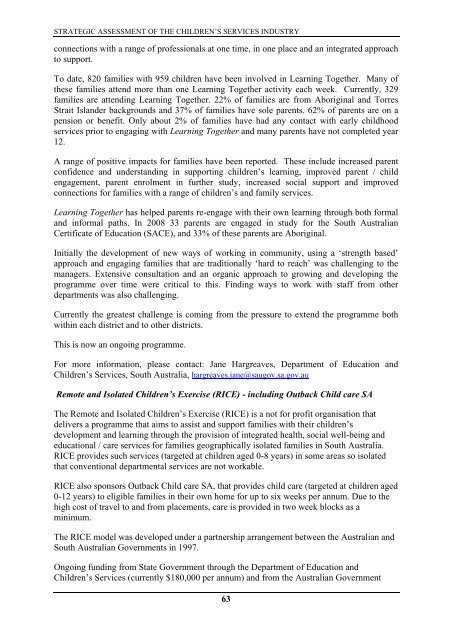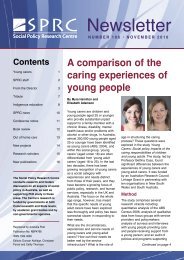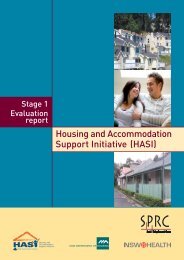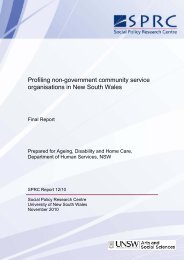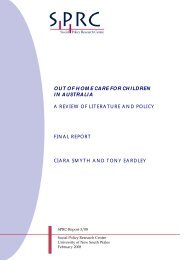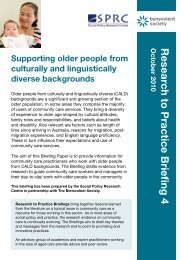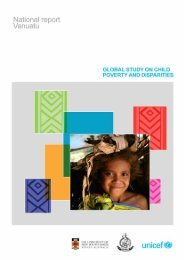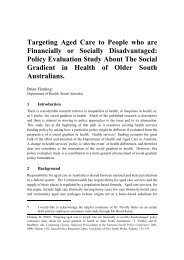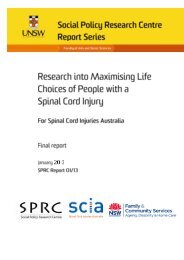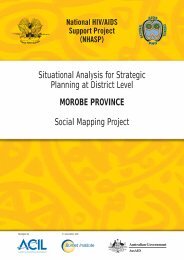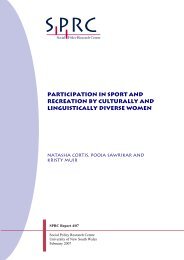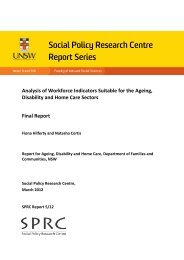A Strategic Assessment of the Children's Services Industry
A Strategic Assessment of the Children's Services Industry
A Strategic Assessment of the Children's Services Industry
- No tags were found...
Create successful ePaper yourself
Turn your PDF publications into a flip-book with our unique Google optimized e-Paper software.
STRATEGIC ASSESSMENT OF THE CHILDREN’S SERVICES INDUSTRYconnections with a range <strong>of</strong> pr<strong>of</strong>essionals at one time, in one place and an integrated approachto support.To date, 820 families with 959 children have been involved in Learning Toge<strong>the</strong>r. Many <strong>of</strong><strong>the</strong>se families attend more than one Learning Toge<strong>the</strong>r activity each week. Currently, 329families are attending Learning Toge<strong>the</strong>r. 22% <strong>of</strong> families are from Aboriginal and TorresStrait Islander backgrounds and 37% <strong>of</strong> families have sole parents. 62% <strong>of</strong> parents are on apension or benefit. Only about 2% <strong>of</strong> families have had any contact with early childhoodservices prior to engaging with Learning Toge<strong>the</strong>r and many parents have not completed year12.A range <strong>of</strong> positive impacts for families have been reported. These include increased parentconfidence and understanding in supporting children’s learning, improved parent / childengagement, parent enrolment in fur<strong>the</strong>r study, increased social support and improvedconnections for families with a range <strong>of</strong> children’s and family services.Learning Toge<strong>the</strong>r has helped parents re-engage with <strong>the</strong>ir own learning through both formaland informal paths. In 2008 33 parents are engaged in study for <strong>the</strong> South AustralianCertificate <strong>of</strong> Education (SACE), and 33% <strong>of</strong> <strong>the</strong>se parents are Aboriginal.Initially <strong>the</strong> development <strong>of</strong> new ways <strong>of</strong> working in community, using a ‘strength based’approach and engaging families that are traditionally ‘hard to reach’ was challenging to <strong>the</strong>managers. Extensive consultation and an organic approach to growing and developing <strong>the</strong>programme over time were critical to this. Finding ways to work with staff from o<strong>the</strong>rdepartments was also challenging.Currently <strong>the</strong> greatest challenge is coming from <strong>the</strong> pressure to extend <strong>the</strong> programme bothwithin each district and to o<strong>the</strong>r districts.This is now an ongoing programme.For more information, please contact: Jane Hargreaves, Department <strong>of</strong> Education andChildren’s <strong>Services</strong>, South Australia, hargreaves.jane@saugov.sa.gov.auRemote and Isolated Children’s Exercise (RICE) - including Outback Child care SAThe Remote and Isolated Children’s Exercise (RICE) is a not for pr<strong>of</strong>it organisation thatdelivers a programme that aims to assist and support families with <strong>the</strong>ir children’sdevelopment and learning through <strong>the</strong> provision <strong>of</strong> integrated health, social well-being andeducational / care services for families geographically isolated families in South Australia.RICE provides such services (targeted at children aged 0-8 years) in some areas so isolatedthat conventional departmental services are not workable.RICE also sponsors Outback Child care SA, that provides child care (targeted at children aged0-12 years) to eligible families in <strong>the</strong>ir own home for up to six weeks per annum. Due to <strong>the</strong>high cost <strong>of</strong> travel to and from placements, care is provided in two week blocks as aminimum.The RICE model was developed under a partnership arrangement between <strong>the</strong> Australian andSouth Australian Governments in 1997.Ongoing funding from State Government through <strong>the</strong> Department <strong>of</strong> Education andChildren’s <strong>Services</strong> (currently $180,000 per annum) and from <strong>the</strong> Australian Government63


